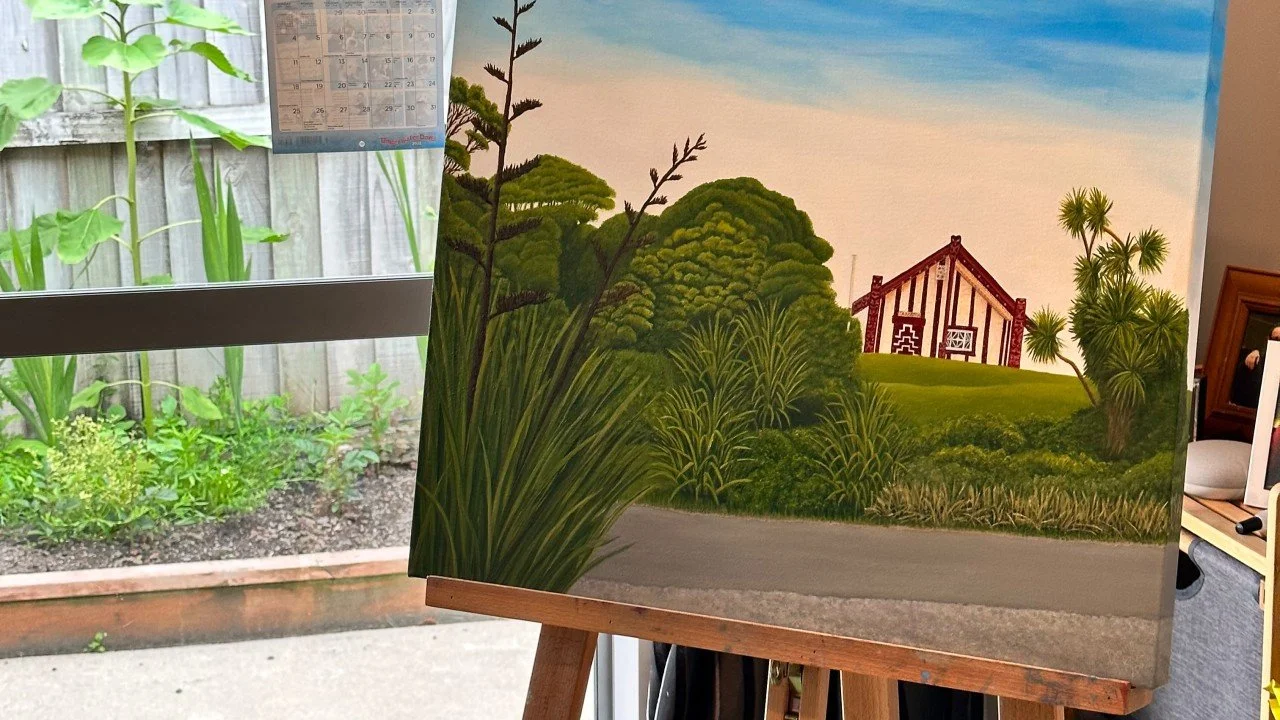Why Decolonisation: Reclaiming Te Ao Māori, Breaking Cycles, and Building Safer Futures
Tamatea te whāre at Ōtakau Marae painted by Donna Howes
Why Decolonisation?
My why is rooted in whakapapa. I am Kāi Tahu, Kāti Māmoe, Waitaha, and Ngāti Maniapoto. I am Tangata Whaikaha Māori. I carry Pacific and Irish heritage, too.
But for much of my life, I felt distanced from te ao Māori, not because I didn’t want it, but because colonisation and trauma built walls between me and my culture. Those walls are not just historic; they are intergenerational. They are personal.
I have carried shame, especially around te reo Māori. I can still remember as a child being made to feel that Māori was lesser, that it had no value, that I was somehow wrong for wanting to learn it. Even as an adult, I have struggled to reclaim reo and tikanga, sometimes stumbling, stepping back when I should have leaned forward.
“Decolonisation for me is not abstract. It is daily, often painful work to reclaim what colonisation tried to strip away.”
The Struggles of Reclaiming Te Ao Māori
Decolonising myself has been far from easy.
Te reo Māori: I am still learning, slowly. Sometimes I feel whakamā when I mispronounce words, forget kupu, or can’t respond fluently. Sometimes I feel like others judge me for not being “enough.”
Unsafe spaces: I’ve been in rooms where te ao Māori was dismissed, where leaders caused intervention harm, or where racism and ignorance created violence, not always physical, but cultural, spiritual, and emotional. Those experiences left me feeling unsafe and hesitant to show up as my full self.
Navigating two worlds: I work in government, health, and international advocacy. Too often, these systems operate on Pākehā terms. I’ve had to bend myself to fit, when what I longed for was to stand strong in te ao Māori.
Colonisation didn’t just strip language and land. It stripped safety. It left Māori like me feeling like we had to choose between worlds, and in choosing, lose something vital.
Reclaiming for Myself, Breaking Cycles for Hiwa
My why is not just about me. It is about my son, Hiwa-i-te-Rangi.
We have enrolled Hiwa in kōhanga reo and intend for him to grow up immersed in te ao Māori, te reo, tikanga, and mātauranga. Watching him learn, sing, and play in te reo Māori is healing for me too. It’s breaking intergenerational trauma, giving him the safe space I never had.
“By raising Hiwa in te ao Māori, I’m creating for him the safety and belonging I wish I had as a child.”
Decolonisation for me is not about rejecting one world for another. It is about weaving them together, reclaiming language, culture, and identity while also navigating health, disability, Rainbow, and global spaces. It’s about ensuring my whānau carries pride instead of shame, resilience instead of silence.
My Why in Decolonisation
So why decolonisation?
Because it is survival. Because it is healing. Because it is justice.
Every time I learn another kupu in te reo Māori, I undo a little of the shame I carried as a child. Every time I speak up in a workplace to bring a Māori perspective, I reclaim a little of the space that colonisation tried to take. Every time Hiwa walks confidently into kōhanga reo, I see the cycle breaking.
This is not easy work. It is confronting. It means facing my own fears and vulnerabilities. It means challenging racism and ignorance in systems that still cause harm. It means unlearning shame and replacing it with mana.
But it is also hopeful work. Because decolonisation is not just about the past. It is about building a future where Māori tamariki don’t grow up doubting themselves. It is about creating workplaces, communities, and whānau where te ao Māori is not an add-on, but a foundation.
“Decolonisation is about raising futures where our children inherit safety, strength, and pride instead of trauma.”
Closing Reflection
My why is to decolonise myself, embrace te ao Māori, and create safer spaces for Hiwa and the generations to come.
I still stumble. I still struggle. But I also stand taller than I once did. And I know this: the work of decolonisation is never finished, but every step is worth it.
Because every kupu, every tikanga, every safe space we reclaim is a victory against colonisation, and a gift to our future.
🔗 Follow me for more reflections on systems change, equity leadership, and human rights diplomacy.
🖤 Ko te pae tawhiti whāia kia tata. Ko te pae tata whakamaua kia tīna. | Seek out the distant horizons so they may become close. Hold fast to the close horizons so they may be secured.


